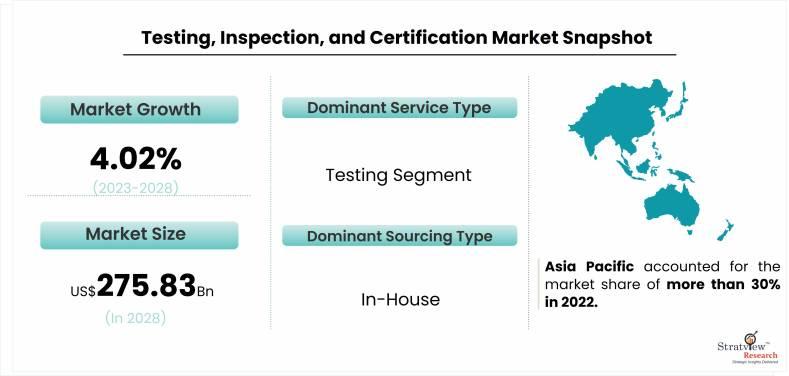The growing importance of data analytics in the Testing, Inspection, and Certification (TIC) Market

Data analytics is the process of collecting, cleaning, and analyzing data to extract meaningful insights. The testing, inspection, and certification (TIC) market is estimated to grow from USD 217.78 billion in 2022 and is likely to grow at a CAGR of 4.02% during 2023-2028 to reach USD 275.83 billion by 2028. It has become increasingly important in the Testing, Inspection, and Certification (TIC) market as TIC providers strive to improve the efficiency, accuracy, and reliability of their services.
Benefits of data analytics for TIC providers
TIC providers can benefit from data analytics in a number of ways, including:
- Improved decision-making: Data analytics can help TIC providers to make better decisions about their operations, such as how to allocate resources, optimize workflows, and identify new market opportunities.
- Enhanced risk management: Data analytics can help TIC providers to identify and manage risks more effectively. For example, TIC providers can use data analytics to identify products or industries that are at high risk of quality problems.
- Reduced costs: Data analytics can help TIC providers to reduce costs by identifying and eliminating inefficiencies in their operations. For example, TIC providers can use data analytics to identify areas where they can automate tasks or streamline workflows.
- Improved customer service: Data analytics can help TIC providers to improve their customer service by providing them with a better understanding of their customers' needs. For example, TIC providers can use data analytics to identify the types of services that their customers are most interested in and to develop new services to meet those needs.
Applications of data analytics in the TIC market
TIC providers are using data analytics in a variety of ways, including:
- Identifying trends and patterns: Data analytics can be used to identify trends and patterns in data, such as the types of products that are most likely to fail or the industries that have the highest rates of accidents. This information can be used to improve the accuracy and efficiency of TIC services.
- Developing predictive models: Data analytics can be used to develop predictive models that can forecast the likelihood of future events, such as product failures or accidents. This information can be used to develop preventive measures and to help customers make better decisions about their products and operations.
- Optimizing operations: Data analytics can be used to optimize TIC operations by identifying and eliminating inefficiencies. For example, data analytics can be used to identify the best times to schedule inspections or to determine the optimal way to allocate resources.
- Developing new services: Data analytics can be used to develop new services that meet the needs of customers. For example, TIC providers can use data analytics to develop predictive maintenance services or to develop services that help customers to comply with industry regulations.
Case studies
Here are some case studies of how TIC providers are using data analytics:
- SGS is using data analytics to develop predictive maintenance services for its customers in the manufacturing industry. SGS uses data from sensors on its customers' equipment to predict when maintenance is needed, which helps customers to avoid costly downtime.
- Intertek is using data analytics to help its customers in the food and beverage industry to comply with food safety regulations. Intertek uses data from its inspections to identify trends and patterns in food safety violations. This information is then used to develop targeted training and consulting programs for its customers.
- Bureau Veritas is using data analytics to develop new services for its customers in the renewable energy industry. Bureau Veritas uses data from its inspections and tests to assess the performance and reliability of renewable energy assets. This information is then used to develop services that help customers to optimize their operations and reduce their costs.
Conclusion
Data analytics is playing an increasingly important role in the TIC market. TIC providers are using data analytics to improve the efficiency, accuracy, and reliability of their services, as well as to develop new services that meet the needs of their customers.
- Art
- Causes
- Crafts
- Dance
- Drinks
- Film
- Fitness
- Food
- الألعاب
- Gardening
- Health
- الرئيسية
- Literature
- Music
- Networking
- أخرى
- Party
- Religion
- Shopping
- Sports
- Theater
- Wellness




